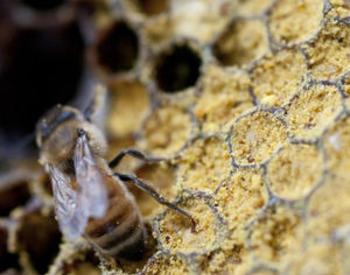Master Beekeeper program adds groundbreaking Spanish-language track as it celebrates 10th year
CORVALLIS, Ore. – Two years ago, Elva Webster knew nothing about bees. Now she’s on her way to tending her own hives as she progresses through a groundbreaking Spanish-language version of a Master Beekeepers program.
The Oregon State University Extension Service’s Master Beekeeper Program, which celebrates its 10th anniversary this year, added the Spanish track in 2020. It offers the same classes, which teach science-based beekeeping techniques to participants who start out at the apprentice level with a mentor, work through a journey level and progress to the prestigious level of Master Beekeeper.
Carolyn Breece, faculty research assistant and coordinator of the Spanish-language version of Master Beekeepers, said it’s the first program of its kind in the United States. The need for such a program became clear during an OSU beekeeping workshop for commercial beekeepers and crews. As the day went on, she noticed Latino crew members bunched together talking in their first language.
“When trying to translate information in your head to a different language it’s a lot more work,” Breece said. “The benefit of having the class in their native language is that they can relax and talk to each other. It’s a much better experience and the response has been really positive. Participants are engaged. They are very happy to be there learning about bees.”
Participants join for multiple reasons – to join a crew, make their own honey or just for the fascination of bees. But there was no formal training for Spanish-speakers interested in beekeeping. That's why Breece stepped in, aided by a team of colleagues and supported by Jen Larsen, who coordinates Oregon’s Master Beekeepers.
“One of the areas in which the Master Beekeeper program shines is our mission to provide an in-depth, beginner-level educational experience to beekeepers all around our region,” Larsen said. “Now, with our ability to transmit this information to Spanish-speaking beekeepers, we have filled a gap in our reach that was badly needed. I am so excited to see where this goes, and how we can grow the number of offerings we can provide in Spanish.”
Hives in mind
Webster, who has worked through the first level, is the garden and community engagement coordinator at Huerto de la Familia. The Family Garden, a Lane County nonprofit that provides opportunities and training in organic agriculture and business creation to Spanish-speaking families.
She helps manage the organization’s six community gardens and looks forward to the time she will be managing the volunteer-tended hives. Webster will be passing on the knowledge she learns to gardeners who long for space and gardening education so they can grow the food they ate in their home countries.
“A lot of our Spanish-speaking people are from different countries,” said Webster, who is from Morelia, Michoacan, Mexico. “Some are from Guatemala, El Salvador or Mexico, from small communities and love to grow their own vegetables. They eat different foods and need information in the language they are most familiar with.”
Webster and 13 others took part in three hands-on workshops in the apiary at the OSU Honey Bee Lab. The first of three workshops needed to complete the course was held on a gorgeous day in May, Breece said. Participants suited up to learn the basics of spring beekeeping – how to spot a queen, how to handle a frame and how to inspect for health and well-being.
The ins and outs of summer management and honey production, a favorite of the class, came second while overwintering colonies and honeybee diseases rounded out the program. Next up is the journey level where participants are expected to do community service like teaching a class and complete independent learning assignments. Moving up to Master Beekeeper takes a lot of initiative. Participants must review a research paper and give a presentation.
It's a rigorous program. Out of 2,319 students enrolled since 2012, only seven have reached Certified Master Level Student.
Breece plans to continue the Spanish-language training into 2023 with the addition of a commercial beekeeper workshop in Spanish. The training is supported by a grant from the U.S. Department of Agriculture's Speciality Crop Block Grant Program.
Ramesh Sagili, professor of apiculture and honeybee Extension specialist in the College of Agricultural Sciences, said that that Spanish-speaking clientele interested in beekeeping has steadily increased and the Latino workforce is playing a vital role in the success of commercial beekeeping operations.
“Until now there had been no formal training programs to meet the needs of this critical group,” Sagili said. “With our new Spanish version of Oregon Master Beekeeper program, we envision meeting this growing demand with the goal of promoting honeybee health and fostering inclusivity and diversity in the beekeeping community and industry.”
'Amazing opportunity'
Webster is thrilled to be learning about beekeeping. At one of Huerto de la Familia's community gardens, a participant donated three beehives. Webster, who grows her own vegetables and helps other gardeners, became enamored and wanted to help maintain the hive. Someday she’d like to have her own colony.
“The bee class is an amazing opportunity,” said Webster, who has two degrees in fashion design but decided she was done sitting in an office. “I’m just so happy out there. I learn new things all the time. The more I go to class and learn about them, it’s just fascinating.”
Webster said the program has opened her eyes to the importance of bees. If there aren’t bees, there aren’t humans, she said.
“If they die, we die,” Webster said. “If they can’t pollinate, we don’t harvest anything. More important, this has opened my mind and eyes to change the way I plant things in my garden. Now I’m motivated to choose plants that are good for bees and butterflies and hummingbirds.”

 Extension Service
Extension Service
